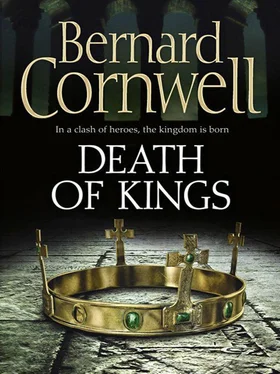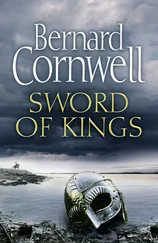‘Too many powerful men in southern Mercia want Wessex’s protection,’ she said, ‘and Æthelred really is not interested in power.’
‘He’s not?’
‘Not now. He used to be. But he falls ill every few months and he fears death. He wants to fill what time he has with women.’ She gave me a very tart look. ‘He’s like you in some ways.’
‘Nonsense, woman,’ I said, ‘Sigunn is my housekeeper.’
‘Housekeeper,’ Æthelflaed said scornfully.
‘And terrified of you.’
She liked that and laughed, then she sighed as an unwise blow of the mason’s mallet knocked off the sad chicken’s beak. ‘All I asked for,’ she said, ‘was a statue of Werburgh and one goose.’
‘You want too much,’ I teased her.
‘I want what my father wanted,’ she said quietly, ‘England.’
In those days I was always surprised when I heard that name. I knew Mercia and Wessex, and I had been to East Anglia and reckoned Northumbria was my homeland, but England? It was a dream back then, a dream of Alfred’s, and now, after his death, that dream was as vague and faraway as ever. It seemed likely that if ever the four kingdoms were to be joined then they would be called Daneland rather than England, yet Æthelflaed and I shared Alfred’s dream. ‘Are we English?’ I asked her.
‘What else?’
‘I’m Northumbrian.’
‘You’re English,’ she said firmly, ‘and have a Danish bedwarmer.’ She prodded me hard in the ribs. ‘Tell Sigunn I wish her a good Christmas.’
I celebrated Yule with a feast at Fagranforda. We made a great wheel from timber, more than ten paces wide, and we wrapped it in straw and mounted it horizontally on an oak pillar and greased the spindle with fleece-oil so that the wheel could revolve. Then, after dark, we set fire to it. Men used rakes or spears to turn the wheel, which whirled about spewing sparks. My two youngest children were with me, and Stiorra held my hand and gazed wide-eyed at the huge burning wheel. ‘Why did you set fire to it?’ she asked.
‘It’s a sign to the gods,’ I said, ‘it tells them that we remember them, and it begs them to bring new life to the year.’
‘It’s a sign to Jesus?’ she asked, not quite comprehending.
‘Yes,’ I said, ‘and to the other gods.’
There was a cheer when the wheel collapsed and then men and women competed to jump over the flames. I held my two children in my arms and leaped with them, flying through the smoke and sparks. I watched those sparks fly into the cold night and I wondered how many other wheels were burning in the north where the Danes dreamed of Wessex.
Yet if they dreamed they did nothing about those dreams. That, of itself, was surprising. Alfred’s death, it seemed to me, should have been a signal to attack, but the Danes had no one leader to unite them. Sigurd was still sick, we heard Cnut was busy beating the Scots into submission, and Eohric did not know whether his loyalties were to the Christian south or to the Danish north and so did nothing. Haesten still lurked in Ceaster, but he was weak. Æthelwold remained in Eoferwic, but he was helpless to attack Wessex until Cnut allowed it and so we were left in peace, though I was sure that could not last.
I was tempted, so tempted, to go north and consult Ælfadell again, yet I knew that was stupid, and I knew it was not Ælfadell I wished to see, but Erce, that strange, silent beauty. I did not go, but I had news when Offa came to Fagranforda and I sat him in my new hall and piled the fire high to warm his old bones.
Offa was a Mercian who had once been a priest, but whose faith had weakened. He abandoned the priesthood and instead walked about Britain with a pack of trained terriers who amused folk at fairs by walking on their hind legs and dancing. The few coins those dogs collected would never have paid for Offa’s fine house in Liccelfeld, but his real talent, the skill that had made him wealthy, was his ability to learn about men’s hopes, dreams and intentions. His ludicrous dogs were welcome in every great hall, whether Dane or Saxon, and Offa was sharp-eared and sharp-minded, and he listened, he questioned, and then he sold what he had learned. Alfred had used him, but so did Sigurd and Cnut. It was Offa who told me what happened in the north. ‘Sigurd’s sickness doesn’t seem fatal,’ he told me, ‘just weakening. He has fevers, he recovers, then they come back.’
‘Cnut?’
‘He won’t attack south till he knows Sigurd will join him.’
‘Eohric?’
‘Pisses himself with worry.’
‘Æthelwold?’
‘Drinks and humps servant girls.’
‘Haesten?’
‘Hates you, smiles, dreams of revenge.’
‘Ælfadell?’
‘Ah,’ he said, and smiled. Offa was a lugubrious man who rarely smiled. His long, deep-lined face was guarded and shrewd. He cut a slice of the cheese made in my dairy. ‘I hear you’re building a mill?’
‘I am.’
‘Sensible, lord. A good place for a mill. Why pay a miller when you can grind your own wheat?’
‘Ælfadell?’ I asked again, placing a silver coin on the table.
‘I hear you visited her?’
‘You hear too much,’ I said.
‘You compliment me,’ Offa said, scooping up the coin. ‘So you met her granddaughter?’
‘Erce.’
‘So Ælfadell calls her,’ he said, ‘and I envy you.’
‘I thought you had a new young wife?’
‘I do,’ he said, ‘but old men shouldn’t take young wives.’
I laughed. ‘You’re tired?’
‘I’m getting too old to keep straying the roads of Britain.’
‘Then stay home in Liccelfeld,’ I said, ‘you don’t need the silver.’
‘I have a young wife,’ he said, amused, ‘so I need the peace of constant travel.’
‘Ælfadell?’ I asked yet again.
‘She was a whore in Eoferwic,’ he said, ‘years ago. That’s where Cnut found her. She told fortunes as well as whoring, and she must have told Cnut something that turned out to be true because he took her under his shield.’
‘He gave her the cave at Buchestanes?’
‘It’s his land, so yes.’
‘And she tells folk what he wants them to hear?’
Offa hesitated, always a sign that whatever answer was required needed a little more money. I sighed and placed another coin on the table. ‘She speaks his words,’ Offa confirmed.
‘So what’s she saying now?’ I asked, and he hesitated again. ‘Listen,’ I went on, ‘you wizened piece of goat gristle, I’ve paid enough. So tell me.’
‘She’s saying that a new king of the south will arise in the north.’
‘Æthelwold?’
‘They’ll use him,’ Offa said bleakly. ‘He is, after all, the rightful King of Wessex.’
‘He’s a drunken idiot.’
‘When did that make a man unfit to be king?’
‘So the Danes will use him to placate the Saxons,’ I said, ‘then kill him.’
‘Of course.’
‘Then why wait?’
‘Because Sigurd is sick, because the Scots are threatening Cnut’s land, because the stars aren’t aligned propitiously.’
‘So Ælfadell can only tell men to wait for the stars?’
‘She’s saying that Eohric will be King of the Sea, that Æthelwold will be King of Wessex, and that all the great lands of the south will be given to the Danes.’
‘King of the Sea?’
‘Just a fancy way of saying that Sigurd and Cnut won’t take Eohric’s throne. They worry that he’ll ally himself with Wessex.’
‘And Erce?’
‘Is she as beautiful as men say?’ he asked.
‘You haven’t seen her?’
‘Not in her cave.’
‘Where she’s naked,’ I said and Offa sighed. ‘She is more than beautiful,’ I said.
‘So I hear. But she’s a mute. She can’t speak. Her mind is touched. I don’t know if she’s mad, but she is like a child. A beautiful, dumb, half-mad child who drives men wholly mad.’
Читать дальше
Конец ознакомительного отрывка
Купить книгу












